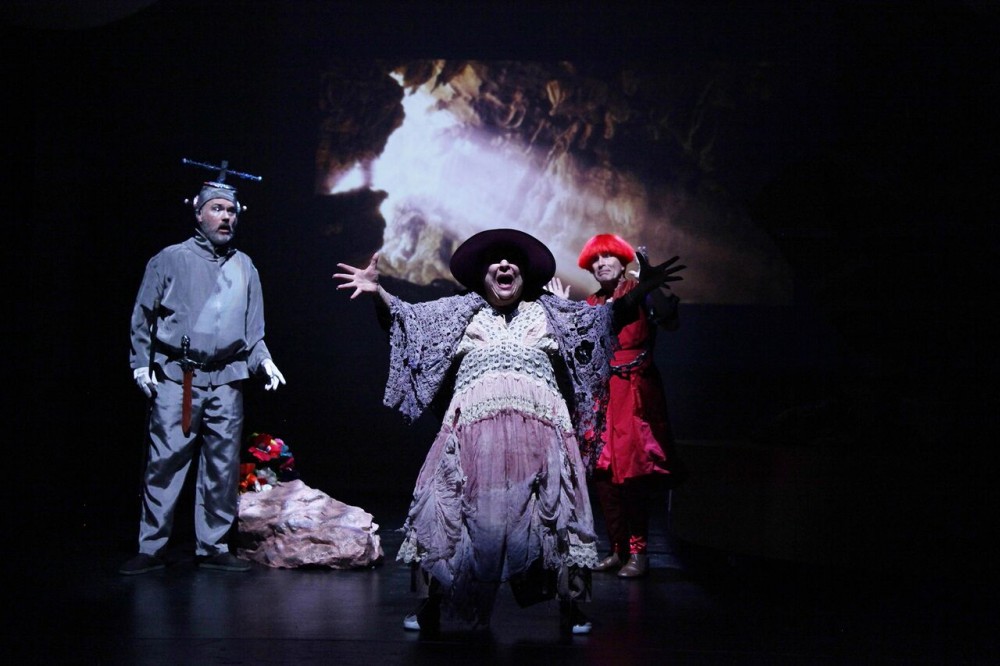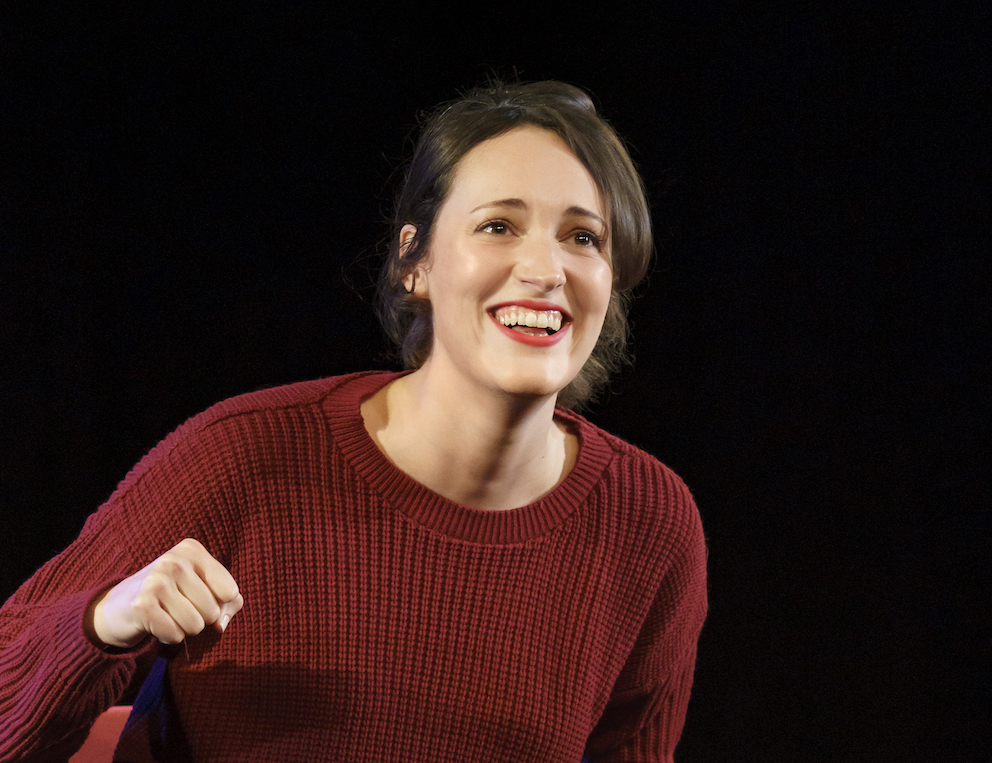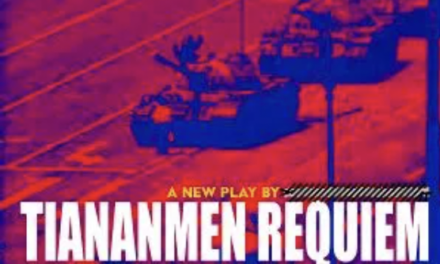Combine Oscar Wilde and Ernest Hemingway and the result is an ambitious, if flawed, entertainment.
By Joel Benjamin
Oscar Wilde and Ernest Hemingway together on the same stage? In the same breath? Seems like a very odd literary and theatrical pairing, at least at first glance. But, the M-34 troupe believe they’re on to a good idea combining Wilde’s The Important of Being Earnest with excerpts from several Hemingway works like The Sun Also Rises, A Farewell to Arms and Death in the Afternoon. This adaptation by the director James Rutherford (in collaboration with Elliot B. Quick) also mines Wilde’s Salome and De Profundis. The point was to use Hemingway’s cleanly written observations to add psychological depth to the upper crust repartee of Wilde.
In order to make this match more smooth, Rutherford, who uses pretty much all of the original three-act version of Earnest, moves the setting from Victorian England to France in 1926, a period in which Hemingway was famously bouncing around Europe with an emphasis on Paris and the avant-garde art world. A few lines are spoken in French to add verisimilitude.
There have long been theories that Hemingway, despite his ultra-macho public persona, was a bit of a closet case and this rumor gives this production its raison d’être with a thread of a same sex plot, that culminates in a very explicit homosexual pairing, satisfying modern audiences who have long found a homosexual subtext in Wilde’s preciously stylized bantering characters. This explicitness, unfortunately, poses more problems than it solves, leaving a very peculiar mood at the end when it turns out the two characters have inadvertently committed incest. It also more clearly exposes the fact that Jack/Ernest is affianced to his first cousin, Gwendolyn!
Mr. Rutherford has taken a free-wheeling attitude toward Wilde and Hemingway, staging the play on a raised platform on which the characters cavort. Algernon (Ross Cowan) and Jack (Tim Hassler) are first seen boxing with each other, although they spend more time embracing than actually hitting each other. This gives their dialogue a muscularity as they discuss each other’s “Bunburyist” adventures. (In Earnest, Algernon uses a fictional friend, Bunbury, as an excuse to misbehave.) There is much physical play and way too much shtick such as one elongated scene in which each character, in turn, is ordered to “sit,” upon which order he or she climbs onto a lawn table and is provided with a chair just in the nick of time. Wrestling abounds. Bill Irwin’s bit of going down a staircase by lowering his body is used several times, too. In fact Mr. Rutherford’s staging is too full of gratuitous machinations which please the audience but don’t serve the hybrid Wilde/Hemingway scenario as well as he believes. Yet he manages to make a good deal of the acting a refreshing take on the usual stiff-upper-lip versions of Wilde. In this, the Hemingway helps pierce the Wilde façade and grounds the Wilde silliness with its straightforwardness.
Sometimes the simple, unadorned language of Ernest Hemingway actually complements the ornate, filigree of Oscar Wilde’s. Sometimes it’s a punch in the gut as in an exchange between Algy and Jack in the second act in which Algy, quoting The Sun Also Rises, speaks of his reluctance to be labeled a “faggot” even though he is “very fond” of Jack. Later, in Act Two, Algy quotes A Farewell to Arms’s famous line, “A coward dies a thousand deaths…” Merriman, the butler in Act Two, speaks of “la generation perdue” (the lost generation) in yet another interpolation. Jack, after searching for the handbag in which he was found as an infant, the one which the character Ms. Prism famously mislaid, delivers a dramatically unjustified monologue from Death in the Afternoon. Algy, now christened Ernest, uses Salome’s sensual retort to the head of John the Baptist as the expression of his feelings towards Jack, also renamed Ernest, with whom he just had a sexual tryst. (Yes, Wilde’s plot is farcical and decidedly unrealistic.)
The simple set by Oona Curley (who also did the lights) was used well with the change from Paris to the countryside indicated by well-placed, appropriate furniture. Nikki Delhomme’s costumes wittily update the period from the Edwardian to the Jazz Age.
The acting isn’t subtle, but that is in keeping with Mr. Rutherford’s vision. The two male leads, Messrs. Cowan and Hassler, are perfectly matched and give their all to keep the energy flowing. They manage to make the transitions from one author to the other seamless, using every word to illuminate their characters. As Lady Bracknell, Charise Greene uses a “take no prisoners” approach, lording over everyone with a voice that could shatter glass. A slight reduction in shrillness will make her interpretation the perfect modern manifestation of the haughty character so vividly created on film by Dame Edith Evans. As Gwendolyn, Anne Troup is the ideal flapper-wannabe of the period caught between the rules of society and the demands of her times. The Cecily of Charlotte Graham is full-bodied and shrewd. Wilde’s lines almost sound facetious in her delivery, which is just fine.
In the smaller roles, Ned Risley and Wheaton Simis as the two butler types, Lane and Merriman, work hard to make three-dimensional characters and succeed. Leighton Bryan as Ms. Prism, the scatter-brained governess who “misplaced” the infant Jack in the Grand Central Terminal at the Port Washington Line (!), doesn’t quite get the character until she is allowed to remove a bustle and, literally, let her hair down at which point she becomes a real woman who clearly can take advantage of her relationship with Frederick Chasuble, the rector of the local church who is called upon to re-name Algy and Jack. Alexander Salamat as Chasuble can’t seem to settle on an accent. He seems Spanish, then Italian and, at one point, Irish. However, he is probably the sexiest Chausible on record.
The M-34 production of The Importance of Being Ernest Hemingway is an honest attempt to revivify an old chestnut and, for the most part, works well. Certainly anyone who thinks Wilde’s farce has no relevance should hike up the four flights to the Access Theater and enjoy this fusion of the works of two literary giants.
*Photos Nikki Delhomme
The Importance of Being Ernest Hemingway – August 17th-September 1st, 2013The Access Theater
380 Broadway – 4th Floor (Between White and Walker Sts.) NYC (Note: An elevator is available upon request.
Tickets and Information: www.M-34.org
Running Time: 2 ½ hours with one intermission
























